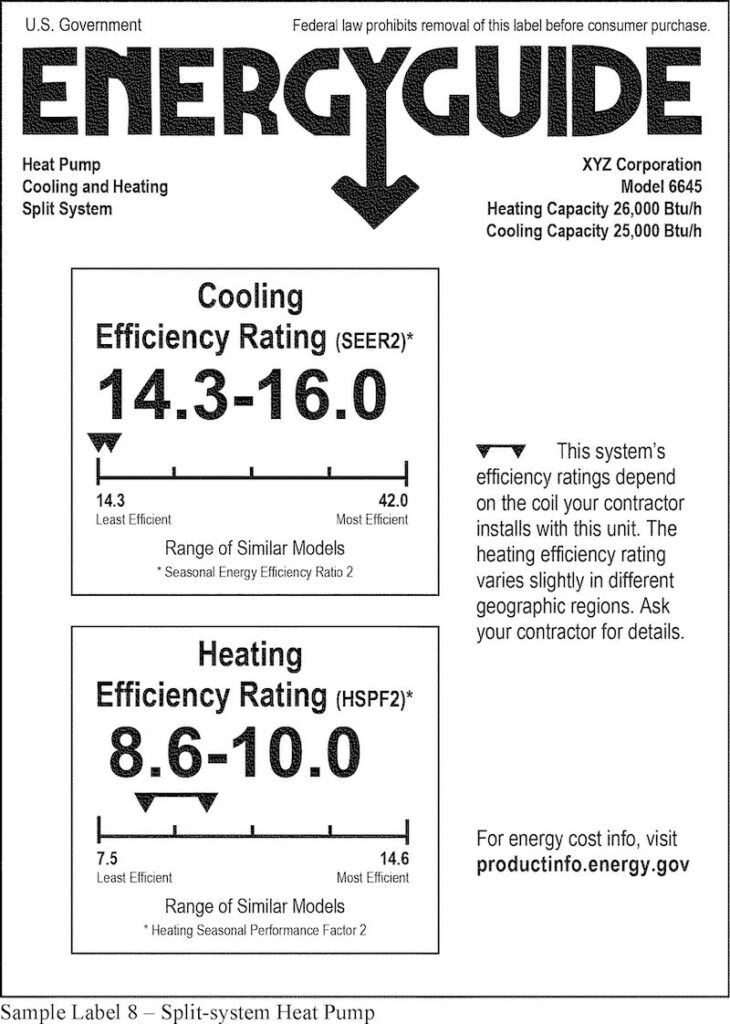The HVAC industry needs a way to measure the efficiency of the equipment they install in your home. These standards are known as SEER (Seasonal Energy Efficiency Ratings). To reflect changing needs, how this standard is measured, and the minimum ratings allowed for equipment installed by contractors or the construction industry are enforced by the Department of Energy (DOE). In this article, we'll examine the latest SEER regulations, known as SEER2. We'll explain what SEER regulations and ratings are, what products are affected by SEER regulations, how this affects the equipment you can buy from HVAC companies and more.
Did you know that HVAC equipment, like air conditioning units, gas furnaces, condensers, and more, are rated for efficiency? These efficiency standards are known as SEER (Seasonal Energy Efficiency Ratio) ratings. Think of it as something like your car's fuel efficiency, except in this case you're measuring comfort per energy dollar spent, not miles per gallon. And like an MPG rating, the higher the number the better. With higher SEER ratings, your heating and cooling equipment will have a smaller carbon footprint and save you money on your energy bills.
By 2023, new SEER standards, known as SEER2 are going into effect. This can affect the equipment available for use in your home.
Let's examine the old SEER standards and then take a look at the new standards - how they've changed, and how they'll affect you when you need to upgrade your HVAC equipment.
The Federal government set the first SEER standards in 1975. However there were no rules regarding minimum SEER ratings for air conditioning and HVAC equipment until 1987,
Those requirements aren't the same across the nation. There are three different regional requirements, dependent upon geography: North, Southwest, and for customers in Texas, the Southeast.
Within each region, there are three different ratings that must be met for air conditioning, split systems, heat pumps, and other equipment. For cooling units, the current requirement is 15. These will be different, starting in 2023.

There are two primary changes coming in 2023.
While it may appear that this is a decrease in efficiency standards, because of the new testing requirements, equipment measured with these standards (SEER2) is significantly more efficient than those with a similar rating measured by the old (SEER) standards.
What types of products are covered by the new SEER2 guidelines? Here's a short list.
Air conditioning condensing units are the outdoor portion of a split HVAC system. They're most often paired with a coil and air handler to comprise a split AC unit.
Heat pumps operate to both warm and cool the air inside your home by tapping into differences in the temperature between indoors and outdoors. They're highly efficient and are an integral part of most modern HVAC systems for the home.
A single packaged unit comprises all of the equipment required for central air conditioning in one unit that is placed outside of the home. These are most common in homes with little indoor space or no underground space.
Evaporator coils are the part of your air conditioner or heat pump that absorbs heat from the air in your home. They're attached to the air handler.
Gas furnaces are used for heating, and they're also covered by the SEER2 requirement for energy-efficient systems.
As the list suggests, air conditioners aren't the only thing covered by SEER2 requirements. HVAC contractors have to meet SEER2 requirements when meeting consumer demand for new and improved HVAC systems.
HVAC manufacturers are improving the efficiency standard of their equipment all of the time, and that trend in efficiency growth will increase in the future. New technology, particularly smart home technology will continue to make AC units and other HVAC equipment more efficient throughout the industry.
Companies that install air conditioning and other HVAC equipment need to ensure that all equipment installed in the future, starting in 2023, meets the new standards.
Older inventory that doesn't meet the new requirements cannot be sold or installed after January 1, 2023, so if you're looking to have work done on your HVAC system, either to reduce energy costs or to replace defective equipment, it's probably wise to check with HVAC business owners now to see how prices on gear may be affected by the new standards.

Understanding the new requirements, and comparing equipment - AC units, heat pumps, condensers, self-packaged units, mini-split systems, and more - can be complicated. That's where it's smart to work with a trusted HVAC Contractor.
Team Enoch has the expertise necessary to ensure that you'll get the right equipment for cooling and heating your home. Their HVAC technicians will work with you to explain the benefits of different types of gear and how well they meet the new requirements for energy efficiency.
Team Enoch performs over 10,000 residential jobs every year, and we take great pride in our many positive reviews. We never use subcontractors, and all of our employees undergo full background checks and extensive training before they work on your home.
If you're in the Dallas Fort Worth area and are interested in upgrading your home's HVAC system to see how you can be more comfortable and save money too, be sure to contact us. Estimates are always free!
